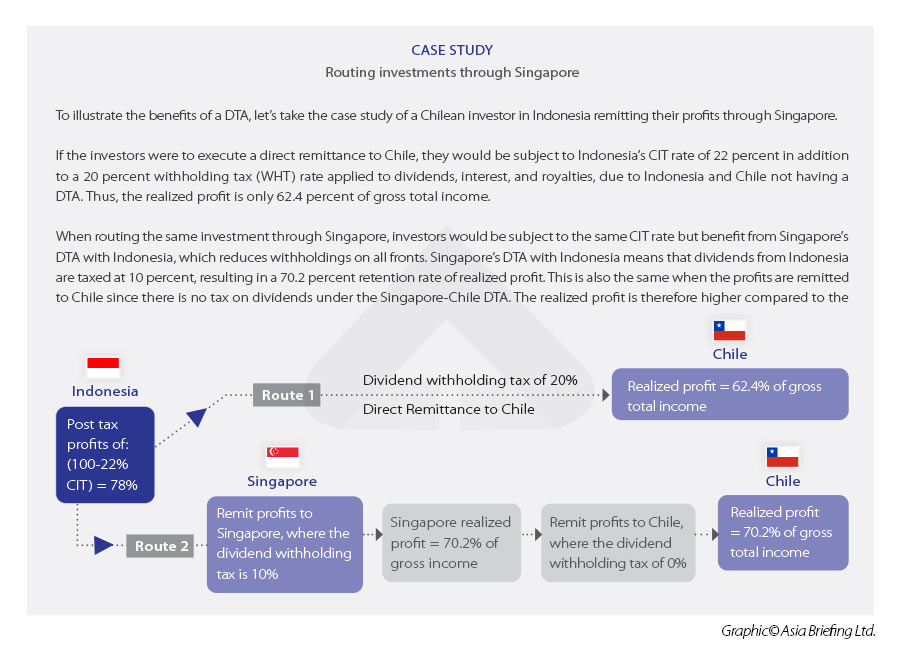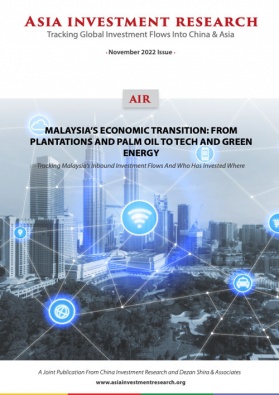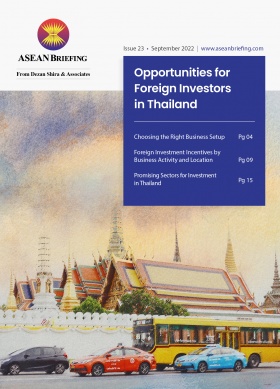Leveraging Singapore’s Incentives and Schemes for Industry 4.0 Investments
Businesses can leverage Singapore’s fiscal and non-fiscal incentives to upgrade their capabilities and expand their scope of operations in the era of industry 4.0. We discuss the industry-specific tax incentives provided by Singapore and recommend an action plan for businesses.
Singapore offers a variety of fiscal and non-fiscal incentives that have been tailored to assist the development of high-value economic activities, as well as encourage businesses to upgrade their
capabilities and expand their scope of operations in the era of industry 4.0.
Applicants must fulfil rigorous requirements, which include committing to certain levels of investments, introducing leading-edge skills, technology, as well as contributing to the growth of research and development and innovation capabilities. However, most of these incentives have local ownership requirements. We highlight some of them here.
Singapore’s industry-specific tax incentives
There are four main government agencies that can administer business and tax incentives for Singaporean entities in specific domains. These are:
- Singapore Economic Development Board (EDB) – which is responsible for developing and executing strategies that facilitate investment into the country’s industries;
- Inland Revenue Authority of Singapore (IRAS) – the tax regulatory authority in the country;
- Enterprise Singapore (ESG) – which aids Singaporean companies expand worldwide and promotes local exports; and
- Monetary Authority of Singapore (MAS) – the central bank and financial services authority.
A full list of industry-specific incentives can be found on the individual websites of these agencies.
The industries eligible for tax incentives are:
- Financial services;
- Banks;
- Fund management;
- Tourism;
- Shipping and maritime;
- Global trading industries;
- Insurance;
- Processing services;
- Research and development;
- Headquarter activities;
- Legal firms;
- E-commerce; and
- Event organization.
Incentives for manufacturing and services activities
Pioneer tax incentive and development and expansion incentive
Through the pioneer tax incentive and the development and expansion incentive, businesses engaging in the manufacture of high-value-added products or services can apply for a pioneer certificate, which entitles them to tax exemption or a concessionary tax rate of five percent or 10 percent for five years. This can be extended depending on the company’s commitment to further expansion.
To qualify, applicants are assessed on a qualitative and quantitative criterion. This includes:
- Ability to introduce create employment for Singaporeans;
- Introduction of new skills and expertise;
- The capacity for business expenditure to create economic spin-off;
- Manufacturing projects must commit to developing soft and hard infrastructure;
- Introduce new technology and know-how that can advance an industry; and
- Business activities must be new and have not been undertaken by other companies in the country.
After the pioneer tax incentive period has ended, businesses can attain the development and expansion incentive. This awards companies that migrate to business activities that add more value
(such as investing in projects that advance key industries like manufacturing), with a five to 10 percent tax break. The tax relief period is subject to a maximum of 40 years.
The 100 percent investment allowance scheme
The investment allowance incentive is administered by the EDB, from which businesses can enjoy a tax exemption of up to 100 of fixed capital expenditure incurred. The EDB defines fixed capital expenditure as expenditure incurred for qualifying projects within a five-year period, which can be extended up to eight years. An extension of the 100 percent Investment Allowance (IA) scheme has been granted by the government until 2023.
- The approved 100 percent IA support is capped at S$10 million (US$7.4 million) and is part of the Automation Support Package (ASP), which comprises the following grants, loans, and tax support:
- Grant support through the Enterprise Development Grant (EDG), capped at S$1 million (US$737,705) for up to 50 percent of qualified automation projects;
- Loan financing of up to S$15 million (US$11.1 million) for automation equipment; and
- The 100 percent IA scheme.
The ASP support itself ended on March 31, 2021, but the 100 percent IA scheme will still be available. This program offers tax relief that can be used to offset taxable income for approved automation projects by the EDG and ESG. The approved projects by the EDB include, among others:
- Manufacture of new products or increase production of existing products;
- Promotion of the tourism industry in the country;
- Research and development activities;
- Energy efficiency projects;
- Construction projects;
- Projects that focus on reducing water consumption;
- Provide specialized engineering or technical services; and
- Maintenance, repair and overhaul services for the aircraft industry.
- The category for expenditures covered by the investment allowance consists of:
- New productive equipment;
- Building factories in Singapore; and
- Acquiring patents and know-how.
The land intensification allowance scheme
Introduced under the 2010 State Budget announcement, the land intensification allowance (LIA) scheme is a targeted program that aims to promote the use of industrial land towards higher value-added activities. Recipients of this scheme will enjoy the following allowances on qualifying capital expenditure incurred for the construction or renovation of an approved LIA building structure:
- Initial allowance of 25 percent; and
- Annual allowances of five percent until the total allowance amounts to 100 percent of qualifying expenditure.
The LIA is available to businesses in the manufacturing and logistic sectors that have large land takes and low Gross Plot Ratios (GPR).
Incentives for innovation, research and development, and capability development
Tech@SG Program
In January 2020, Singapore’s government launched the Tech@SG program, which aims to help Singapore-based technology companies recruit highly skilled foreign talent, and expand in the region.
Companies that qualify for this program are eligible to receive up to 10 new Employment Passes (EPs) to hire foreign nationals and is valid for up to two years. Further, Tech@SG will support the renewal of the EP and extend them for up to three years. Thereafter, the EP must be renewed through the process implemented by the Ministry of Manpower (MOM).
The EP is mainly issued to foreign managers, executives, and skilled professionals in Singapore. Individuals must also be earning a monthly salary of SG3,600 (US$2,549) to be eligible. Companies that qualify for Tech@SG must meet the following criteria:
- Must be a company incorporated in Singapore with the Accounting and Corporate Regulatory Authority (ACRA);
- Must be a company that has a digital or technology offering as part of its core business product or service. This includes providing hardware or software technologies, e-commerce activities, digital gaming, digital media, cybersecurity, data science, and fintech, among many others;
- Secure more than US$10 million (in cumulative) investment funding in the past 36 months; and
- Receive funding from one of the Tech@SG investment firms in the past 36 months.
There are two methods of applying for Tech@SG depending on the ownership of the applicant company. If the company has less than 30 percent local shareholding, it should submit its application to the EDB. For companies with at least 30 percent or more local shareholding, the submission should be done through Startup SG, as an entity under ES.
Companies are usually told the outcome of their application within 10-15 working days.
Tech.Pass
In January 2021, Singapore issued a new work permit named Tech.Pass, aimed at attracting highly accomplished technology entrepreneurs, experts, and business leaders. Unlike the Employment
Pass, the Tech.Pass scheme does not require the sponsorship of a local employer, giving the professional greater flexibility in their activities, such as being an employer, investor, starting a business,
or becoming a director or consulting in one or more Singapore-based tech companies. This work permit also allows holders to switch between employers.
The government has imposed strict eligibility criteria for Tech.Pass applicants. They must satisfy at least two of the following conditions:
- Their last fixed monthly salary of at least S$20,000 (US$14,852), or its equivalent in foreign currency;
- Having at least five years of experience in a leading role in a tech company that has a market valuation of at least US$500 million or have raised at least US$30 million in funding; or
- Having at least five years of experience in a leading role in the development of a tech product that has at least 100,000 monthly active users or at least garnered US$100 million in annual revenue.
Intellectual property development incentive
The intellectual property development incentive (IDI) was introduced in 2018 to encourage the commercialization of intellectual property arising from research and development activities. Recipients can enjoy a reduced corporate tax rate of five or 10 percent of qualifying IP income. This incentive period is limited to an initial period not exceeding 10 years, after which the taxation rate will then increase by 0.5 percent starting in the 11th year of the incentive period.
Tax deductions on qualifying R&D expenses
The Singapore government has offered an enhanced tax deduction of 250 percent of qualifying expenditure for R&D projects carried out in Singapore for the years of assessment between 2019
to 2025. To qualify, companies must effectively own and can commercially exploit the IP or other results from the R&D activities.
Activities that do not qualify as R&D include:
- Routine data collection;
- Management studies or efficiency surveys;
- Market research;
- Cosmetic modifications to products or production methods; or
- Routine modification to products or production methods.
Intellectual property acquisition expenses
An enhanced 200 percent tax deduction is available for each of the following expenditure amount for the years of assessment between 2009 to 2025:
- The first S$100,000 (US$70,700) of qualifying expenditure incurred during IP registration; and
- The first S$100,000 (US$70,700) incurred for the licensing of IP.
Incentives for finance and treasury activities
Finance and treasury center
Under this scheme, income derived from finance and treasury activities is taxed at a reduced rate of eight percent. Such approved activities include international treasury and fund management
activities, investment and economic research analysis, and corporate finance and advisory services.
Financial sector incentive
Through the financial sector incentive, any income from high-value-added activities, such as transactions and services related to the equity market, derivatives market, and bond market, may
be taxed at five percent, while other activities will qualify for a 13.5 percent tax rate.
Financial sector technology and innovation scheme
This scheme provides co-funding to develop financial technology (Fintech) that enhances Singapore’s banking industry. The scheme offers support of up to 70 percent for qualifying costs such as IP rights, technical software, manpower skilling, and professional services, among others.
Headquarter and internationalization incentives
International headquarters award
The international headquarter award (IHQ) provides businesses a concessionary tax rate of five or 10 percent on income for businesses that commit to substantive headquarter activities, such as
managing, coordinating, and controlling their regional operations from Singapore.
Merger and acquisition scheme
The merger and acquisition (M&A) scheme provide the acquiring company an M&A allowance of 25 percent (capped at S$10 million (US$7.3 million) of the qualifying acquisition value capped at S$40 million (US$29.5 million) per year of assessment, stamp duty relief capped at S$80,000 (US$59,000), and double tax deduction transaction costs capped at S$100,000 (US$70,700).
Double tax deduction for internationalization
Under this incentive, the business can receive up to 200 percent tax deduction on expenses used for international expansion. Most DTDi deductions are subject to approval from Enterprise Singapore (ESG) and the Singapore Tourism Board. However, certain activities do not require approval on the first S$150,000 (US$111,000) of eligible expenses.
Progressive Wage Credit Scheme
The Progressive Wage Credit Scheme (PWCS) was introduced into the 2022 budget to help employers adjust to mandatory increases for lower-wage workers. The scheme enables the government
to co-fund the wage increases of Singaporean employees earning a gross monthly wage of up to S$3,000 (US$2,213). Singaporean residents and permanent resident employees are eligible for the
scheme. Under the scheme, employees can receive support for gross monthly wage increases up to S$2,500 (US$1,844) from 2022 to 2026, as well as support for gross monthly wage increases above S$2,500 (US$1,844) and up to S$3,000 (US$2,213) from 2022 to 2024. Eligible wage increases will be co-funded for a period of two years.
Eligible employers do not need to apply and will be informed by the Inland Revenue Authority of Singapore (IRAS) of any payouts.
Business action plan: Leveraging Singapore’s industry 4.0 fiscal and non-fiscal incentives
Businesses involved in industry 4.0 activities in Singapore should develop a tax strategy that covers the following action points to ensure their operational bottom lines are strengthened and there is room for growth:
Determine your eligibility for industry-specific tax incentives: To start, determine the government agencies responsible for administering incentives for businesses operating in your industry. These include the EDB, the IRAS, Enterprise Singapore, and the MAS. Check their individual websites for a full list of industry-specific incentives available.
Apply for pioneer tax incentive or development and expansion incentive: If your business engages in the manufacture of high-value-added products or services, apply for a pioneer certificate to enjoy tax exemption or applicable concessionary tax rate. This will depend on the company’s commitment to further expansion. Make sure to fulfil the qualitative and quantitative criteria set by the government.
Look into the 100 percent investment allowance scheme: Administered by the EDB, the program offers tax relief that can be used to offset taxable income for approved automation projects by the EDG and ESG.
Explore the land intensification allowance scheme: This program provides a targeted allowance on qualifying capital expenditure incurred for the construction or renovation of an approved LIA building structure. The LIA is available to businesses in the manufacturing and logistic sectors that have large land takes and low Gross Plot Ratios (GPR).
Consider incentives for innovation and R&D: The Tech@SG program helps Singapore-based technology companies recruit highly skilled foreign talent and expand in the region. Other incentives are available for research and development, such as the Research, Innovation, and Enterprise (RIE) 2025 plan and the Intellectual Property (IP) Competency Framework.
Seek professional advice: Consider engaging a professional service provider that can provide advice on the available incentives and help you navigate the application process.
Fulfil the requirements: Make sure to fulfil all the requirements set by the government for each incentive program. These may include committing to certain levels of investments, introducing leading-edge skills and technology, and contributing to the growth of research and development and innovation capabilities.
About Us
ASEAN Briefing is produced by Dezan Shira & Associates. The firm assists foreign investors throughout Asia and maintains offices throughout ASEAN, including in Singapore, Hanoi, Ho Chi Minh City, and Da Nang in Vietnam, in addition to Jakarta, in Indonesia. We also have partner firms in Malaysia, the Philippines, and Thailand as well as our practices in China and India. Please contact us at asean@dezshira.com or visit our website at www.dezshira.com.









